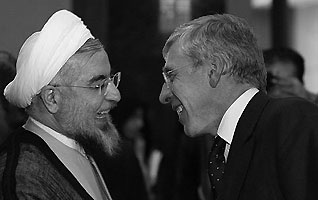Un colloque intitulé" la situation des femmes au Moyen-Orient face au fléau de l'intégrisme islamiste", s'est tenu la semaine dernière à Paris où les intervenants ont abordé la question des femmes à l'aulne des récents bouleversements dans la région.
L'Association des femmes iraniennes, l'Association Femmes-Liberté-Égalité, le Comité de Soutien aux Droits de l'homme en Iran, la Commission des femmes du Conseil national de la Résistance iranienne (CNRI), les Nouveaux Droits de l'homme ainsi que le mouvement citoyen de Montreuil, étaient représentés au colloque qui se tenait en amont de la journée internationale de la femme, le 8 mars prochain.
Elaheh Arjmandi, représentante de la Commission des femmes du CNRI, a expliqué la situation de misogynie institutionnalisée qui prévaut en Iran, "un système comme il en existe peu dans l’histoire contemporaine". Voici le texte de son intervention:
« Il y a 34 ans, l’intégrisme islamiste a pris le pouvoir en Iran et a instauré un apartheid sexuel fondé sur le rejet des droits des femmes. Le régime iranien a créé une Constitution lui permettant de commettre au nom de l'Islam toutes sortes de violations des droits des femmes et des droits de l’homme.
Dans la dictature religieuse en Iran, la répression et la violence faite aux femmes est la base du pouvoir et nécessaire au maintien de ce régime. Les mollahs ont gouverné pendant plus de trente ans avec le fouet, la torture, le viol, les exécutions, la lapidation, et l’adoption de lois qui réduisent à l’esclavage.
Vous êtes certainement au courant des informations sur les agressions à l’acide en Iran. Pour terroriser la société et lutter contre celles qui refusent le code vestimentaire, les mollahs demandent à des bandes de jeter de l’acide sur des femmes innocentes dans les rues. Certaines de ces victimes hospitalisées dans les villes d’Ispahan et de Téhéran ont perdu la vue et leur visage. Un régime sauvage qui est pire que Daech avec ses agressions à l’acide et au couteau dans les rues. Il veut faire peur aux femmes, les obliger à se soumettre et les enfermer dans les quatre murs de la maison.
Depuis trente ans, le viol dans les prisons, en particulier des femmes, est la méthode essentielle pour briser les détenus. Une fatwa soi-disant religieuse autorise le viol des prisonnières par les gardiens de la révolution. C’est une mesure qui existe depuis les premières années de ce régime et qui a servi de critère aux appareils judiciaire, de renseignement, de sécurité, et aux tortionnaires. Un système comme il en existe peu dans l’histoire contemporaine.
Si les mollahs étaient forcés d’arrêter leur misogynie, leur fascisme religieux s’effondrerait. C’est pourquoi le nouveau président soi-disant modéré Rohani ne fera rien pour réduire la répression des femmes en Iran. Parce que ce serait le début de la fin de cette dictature. Depuis son arrivée à la présidence, plus de 1300 personnes ont été exécutées, dont 50 femmes.
Le régime iranien qui a fondé sa Constitution sur la misogynie, a adopté de nouvelles lois contre les femmes: comme encourager les familles à avoir plus d’enfants, une loi honteuse autorisant le mariage des hommes avec leurs belles-filles mineurs, et la loi autorisant le mariage de fillettes avec le consentement du père. L’an dernier, les chiffres officiels montrent que plus de 40.000 filles de 9 à 15 ans ont été mariées. Et je ne parle pas de la séparation des filles et des garçons dans les écoles, les universités, et la ségrégation sexuelle dans les lieux publics.
La violence contre les femmes en Iran concerne aussi de multiples interdictions, en particulier dans le domaine du divorce, du droit de voyager, de travailler, d’étudier, de la garde des enfants et de bien d’autres droits élémentaires. Mais plus important que tout, dans le domaine de la liberté de penser et du droit de lutter pour la liberté.
La dictature en Iran ne recule devant aucun crime contre les femmes courageuses qui se battent contre la tyrannie. Pour témoin, les dizaines de milliers de femmes torturées et exécutées ces trente dernières années pour s’être dressées contre ce régime. Pour témoin, toutes ces pressions inhumaines et attaques sauvages contre les mille femmes d’avant-garde des Moudjahidine du peuple d’Iran au camp d’Achraf en Irak puis au camp de Liberty près de Bagdad à la demande des mollahs.
Ces femmes qui vivent aujourd’hui au camp Liberty comme dans une prison, subissent un blocus sévère, surtout médical, uniquement parce qu’elles luttent pour la liberté du peuple iranien. Pendant plusieurs années en Irak, le gouvernement Maliki, vassal du régime iranien, et ses agents ont imposé ce blocus et lancé des attaques contre ces camps. En septembre 2013, ils ont commis un massacre, tuant 52 opposants iraniens sans armes et sans défense et prenant un homme et six femmes en otages.
Ces mille femmes résistantes sont l’avant-garde de la lutte contre l’extrémisme islamistes. C’est pourquoi elles sont la cible de la violence et de la férocité de cette dictature. Soutenir ces femmes courageuses, qui forment la principale opposition iranienne, va plus loin que l’aspect humanitaire, c’est soutenir la perspective de la victoire sur le monstre de l’intégrisme qui menace le monde. Car le régime des mollahs est la source de l’intégrisme, de l’extrémisme et du terrorisme.
Notre mouvement est dirigé par une femme, Mme Maryam Radjavi. Notre résistance lutte pour la démocratie et nous le voyons très clairement dans le plan en 10 points de Maryam Radjavi pour l’Iran de demain. Nous voulons un Iran démocratique fondé sur la liberté, l’égalité et la séparation de la religion et de l’État. Nous voulons le respect des libertés pour tous, l’abolition de la peine de mort et l’égalité des droits pour les femmes : l’égalité devant la justice, l’égalité économique, l’égalité dans la famille et la liberté de choisir leurs vêtements. Nous croyons fermement dans la participation égale des femmes à la direction politique de la société. »



























